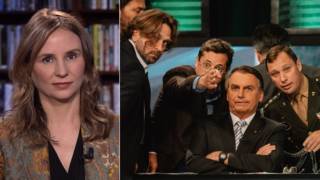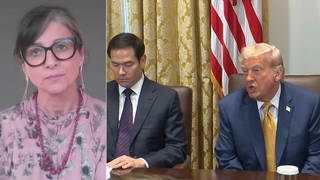
Guests
- Harold Frazierchairman of the Cheyenne River Sioux Tribe.
There’s a standoff brewing in South Dakota, where two Native American Indian tribes are upholding their sovereignty by defying orders by Governor Kristi Noem to remove COVID-19 checkpoints from their territories. The Cheyenne River Sioux and Oglala Sioux tribes say the checkpoints are the best way to protect against the coronavirus entering their communities, which are not equipped to handle an outbreak. The governor says the checkpoints — which are set up on highways on tribal land — are illegal. We speak with the Cheyenne River Sioux Tribe’s Chairman Harold Frazier, who says he is defending his people’s “right to live.”
Transcript
AMY GOODMAN: We begin today’s show with the standoff in South Dakota, where two Native American Indian tribes are defying orders by South Dakota Governor Kristi Noem to remove COVID-19 checkpoints from their territories. The Cheyenne River Sioux and Oglala Sioux tribes say the checkpoints are the best way to protect against the coronavirus entering their communities, which are not equipped to handle an outbreak. The governor says the checkpoints — which are set up on highways on tribal land — are illegal. On Friday, she gave the tribes 48 hours to remove them and threatened legal action. Both the Cheyenne River Sioux and Oglala Sioux have refused, and the checkpoints are still running. In a Facebook Live video Saturday, Oglala Sioux Tribe President Julian Bear Runner said that Governor Noem was threatening the sovereignty of the Oglala people.
PRESIDENT JULIAN BEAR RUNNER: South Dakota’s governor, Kristi Noem, threatened the sovereign interests of the Oglala people when she issued an ultimatum to us on May 8, 2020. … Governor Noem miscalculates our level of dedication to protect our most vulnerable people from crony capitalism, threats to force us to open our economy as they chose to do so. There is no way to place a value on what we have to lose if we let them insult us this way. My relatives, we have been here for millions of years. Whatever they brought to our lands has proven to be poison.
AMY GOODMAN: Seventeen South Dakota lawmakers signed a letter over the weekend urging the South Dakota governor to seek a resolution with the tribes. As of Monday, the state had not yet filed any lawsuit. South Dakota has a COVID-19 death toll of at least 34 and has had more than 3,600 confirmed cases.
For more, we go to Eagle Butte, South Dakota, to the reservation, where we’re joined by Cheyenne River Sioux Tribe Chairman Harold Frazier.
Chairman, welcome to Democracy Now! Thank you so much for joining us. Can you explain what’s happening now? How many checkpoints, COVID checkpoints, have you set up? And what are they for? What are you doing when the cars are stopped?
HAROLD FRAZIER: Yeah, good morning. Right now we have nine checkpoints on our reservation. And, you know, one of the biggest concerns we have is safety. And we are looking, and as soon as we get more equipment, we intend to put up another checkpoint.
You know, the main purpose of these checkpoints is to try to, number one, keep the virus out. And number two is track if it comes in, because we’ve always been saying that the virus does not travel, it’s the people with virus that travel. So, we know that that’s the only way that that virus will get into our homes, is if it’s brought in from the outside. And that’s the main purpose of these checkpoints, is to keep our people safe and also to ensure that [inaudible] have the right to live.
JUAN GONZÁLEZ: Well, Chairman Frazier, what about the governor’s perspective or viewpoint that these checkpoints are illegal? What’s your response to that? Could you talk about your treaties, the existing treaties between your nation and the federal government, that might have some bearing on this or do have bearing on this?
HAROLD FRAZIER: Well, you know, we kind of look, you know, and, number one, my — the people who elected me to this position, they’re the ones that are, I guess, so-called my boss. The governor is not my boss, or the federal government. It’s the people that live here. That’s who I work for, and that’s who I take directives from and such.
But they haven’t — you know, we stepped up to do this. We feel that we have every right to do this. We have a treaty, the 1868 Fort Laramie Treaty, Article 16. In that article, it says that, you know, before any white man can travel or reside on our lands, they must get consent from the Indians first. In addition to our treaties, there’s case law. There’s even our Constitution, that we swore to uphold against all enemies foreign and domestic, that they give us all the legal right to do what we’re doing.
You know, a lot of times — and we’ve been studying the laws of this country for quite a while. How can somebody own something without paying for it? And that’s the way we look at it, that these lands, these roads, they are ours, because we were never paid for it. So we have every legal right to do that. And it doesn’t matter, you know, what comes today, tomorrow. We’re still going to be here. We’re still going to have and maintain our checkpoints.
AMY GOODMAN: Chairman Frazier, can you describe what happens at a checkpoint? And have you been at one? Talk about the people who are stopping the cars and what they’re doing when they stop them.
HAROLD FRAZIER: Well, yeah, I’ve been there to all of our checkpoints numerous times. You know, if a driver rolls up — and it all depends. You know, if a driver rolls up, they’re asked some health questions. There’s a questionnaire that they have to be filled out, and they’re filled out by our deputies. So, there’s really no — you know, I’ve seen some motorists where they just roll down their window partway and answer the questions.
If they’re coming in for essential travel, if they’re a resident of the reservation or a member of the tribe or family to a resident or a member, they’re asked the questions, and they come in. If you’re a motorist coming from a hot spot, your license plates show that, every day we monitor that, where are people — where’s the areas that we’ve got to be concerned with. And if their vehicle is coming from that, then they will be asked to reroute their travel and not come through our lands.
But we allow any commercial vehicles coming, because we need to have supplies just like everyone else. Medical people, they definitely are rolled in. But also, too, essential, and that’s the Postal Service, the agriculture. That’s a big thing on our reservation. So, things like that, they’re allowed to come and go, but they’re all stopped and asked to fill out these questionnaires.
And to expedite a lot of locals, particularly the agriculture, numerous times they come and go to — sometimes they have land in other areas. So, they — what we put together was a process to obtain a permit, an agriculture permit or essential travel permit. And them motorists usually just roll up, just show their permit number, and they’re allowed just to keep going. Usually, it just probably takes a minute to a minute and a half. And if you’re not coming from a hot spot, you’re generally just allowed to just roll on.
So, it’s not really any, in my opinion, hindrance of any motorist. And again, the main purpose is to try to save lives. And I know there was [inaudible] that we should work together. And that’s something that I agree with. But with our population, with our lack of medical facilities, things like that, we know, and we just look to our relatives to the south, the Navajo Nation, and see what’s going on there. And that could easily be us. And we’ve been watching that, so that’s why we stepped up to do these type of actions, to try to keep our people safe and definitely save their lives.
JUAN GONZÁLEZ: And, Chairman Frazier, you mentioned the lack of medical facilities. Could you talk about that? Because you issued a stay-at-home — strict stay-at-home measures, while the governor of the state did not, of South Dakota did not. What is the situation? You only have eight hospital beds and one ICU, as I understand it, on your lands?
HAROLD FRAZIER: Well, we have eight hospital beds. We don’t have no ICU. There are six ventilators. We have one respiratory therapist. And I’m being told by our medical people that generally they monitor two to three ventilators, and they could do four, but that’s pushing it. The nearest facility for critical care is in Rapid City, and it’s about a three-hour drive just to get to Rapid. And that has always been the practice of the Indian Health Service, is to get the care that some of our people need, they generally get referred out.
But when we started this, we started looking at numbers and the number of residents. And when we broke it down, that maybe 50% would possibly get the virus. And when we — they were saying that 80% can be handled at home, and that left 20%. And we looked at the numbers, and we realized that there is a potential that we may need 1,200 beds. And when we only have eight, I mean, that really woke up a lot of people here at home.
AMY GOODMAN: Chairman Frazier, can you talk about the one confirmed COVID case you have had on the reservation and how the checkpoint led you to be able to identify that person?
HAROLD FRAZIER: Yeah. That patient come in, I believe, like on a Thursday. And they knew where they come from. Our command center, which works directly with the checkpoints, they knew the patient come from an area that what we called a hot spot. Our medical people immediately started monitoring every day, you know, being in contact and so forth.
And then, that following Tuesday is when the patient wasn’t feeling well. They took her into the hospital. They ran a test and was tested positive, in a matter of less than probably eight hours, I would say, because the very next morning they already knew the contact, of who they were, and then people were put into quarantine. And right now the patient is doing well, and we’re pretty happy about that.
But that’s the whole purpose of that, because if we didn’t know any of that, and the individual come and they didn’t realize that they were infected by the virus, they could have easily went, and, you know, immediately that could have went into a community spread, which is something that we know we’re definitely not capable of handling.
JUAN GONZÁLEZ: And, Chairman, the governor has threatened to take your tribe to court over the checkpoints, while other lawmakers have urged her to try to negotiate and reach a common agreement. Could you talk about the state’s relationship to your tribe over the years?
HAROLD FRAZIER: Well, you know, it’s just — as a matter of fact, I was just reading something last night. Rapid City, a lot of our members live out there, from us, Oglala, Rosebud. A lot of our Sioux relatives live out there. And there’s a IHS service unit out there. And they ran some tests, and there were 16 positive cases. And I was just reading that, and I was going to get some verification later today. But it sounded like one of the individuals that tested positive, the state Department of Health didn’t even contact that individual 'til three days later. So, you know, we've been — we know the treatment we get from the state and the federal government. And that’s why we’re really doing these things, because we know when times get tough, all we have is each other.
AMY GOODMAN: I mean, this is a very significant situation.
HAROLD FRAZIER: And it’s important that we step up and — yes.
AMY GOODMAN: You have Governor Noem, the South Dakota governor. I mean, when you look at the meatpackers in Sioux Falls, for example, the mayor was begging the governor to shut down the plant. This is before Trump’s executive order that said the state couldn’t. You had hundreds and hundreds of workers, mainly immigrant, overwhelmingly immigrants, who were testing positive. And yet the governor refused to do this. This is the same governor now that is saying she will challenge you, demanding you take down these checkpoints. So what are you willing to take this to, Chairman? Could this lead to a showdown, a standoff, not just legally, but between the state and your tribe?
HAROLD FRAZIER: Well, you know, we have no other alternative. We won’t back down, no matter what they do. Whether it’s through the court or they come by force, we will be still there, because we live here. And, you know, we looked at everything. When we started planning and getting ready back in early March, that’s some of the scenarios we threw out at our plans, was for legal, as well as medical. So, I’m confident that, you know, if you want to — if she wants to take us to court, go ahead and do it. And I believe in my heart that we’re going to be successful.
And the main reason why is we’re doing these things for the right reasons. It’s not to benefit economically, or we’re not doing this to destroy somebody’s business, their lives. I mean, we’re doing it for the good, you know, the good of God. And what we’ve been saying is, you know, the number one right is the right to live. I know that I’ve seen words being thrown out there about liberties and civil rights and First Amendment rights, Second Amendment rights and so forth. But the right to live, I believe, is above all of them. And that’s what we want to do: ensure that our residents here have that right to live.
JUAN GONZÁLEZ: And, Chairman Frazier, you mentioned courts. Could you talk about the recent victory of the Cheyenne River Sioux over the Trump administration, where the Trump administration attempted to use some federal COVID-19 moneys that were intended for the tribes to go instead to the Alaska Native corporations?
HAROLD FRAZIER: Yeah. You know, it was nothing against the Native villages, but we felt that business corporations, that’s chartered under the state, that is not federally recognized — we felt that they shouldn’t get that, because we believe that that money was set aside for Native Americans.
And, you know, the interesting thing, as of today, we still have not been notified how much we’re going to receive here on Cheyenne River. I know a lot of our relatives in North Dakota and the other South Dakota tribes have received or been at least notified how much they’re going to receive. But as of this morning, we have not been notified what we’re going to receive. So, we’ve been kind of thinking, well, I guess they’re pretty upset for us taking them to court; maybe they ain’t gonna give it to us. But, I guess, hopefully by today, we would know if we’re going to receive any of that funding.
AMY GOODMAN: That’s from the CARES Act. The tribes were demanding something like $20 billion, ultimately was settled on $8 billion, but that’s been very slow to make its way out to the various nations. Finally, Harold Frazier, very quickly, if you can talk quickly about the significance of a legal battle here and what it could mean, for example, for the future of ongoing struggles, like your fight against the Keystone XL pipeline?
HAROLD FRAZIER: Oh, yeah, I mean, most definitely. And, you know, there’s already been case law. The recent one in reference to roads and highways was in 1990. And I just can’t think where they’re coming from, you know, reading what the lawmakers at the state Legislature put out there. I mean, and then, even that, the governor has been on briefings saying that they have no jurisdiction. So, I mean, I’m just kind of totally shocked, and almost unbelievable what’s going on, because there’s no way that they can win. There’s just no way. And, yeah, and then, too, we’re trying to focus and stay prepared for this pandemic, and just to have another issue is kind of unbelievable.
AMY GOODMAN: Well, I want to thank you so much, Harold Frazier, for joining us, Cheyenne River Sioux Tribe chairman, speaking to us from Eagle Butte in South Dakota from the reservation.
When we come back, we go to Chicago, where COVID-19 took Black lives first. It didn’t have to. And then we talk about Los New Yorkers, those New Yorkers who are undocumented at the center of the pandemic, who are essential yet underprotected. We’ll speak with a Pulitzer Prize-winning reporter with ProPublica. Stay with us.
[break]
AMY GOODMAN: Valerie Adrian, an Oglala Lakota in Sweetwater, Idaho, participating in the Quarantine Dance Specials.












Media Options